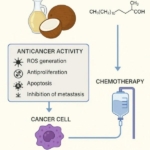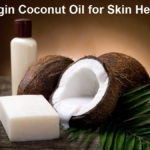
by Brian Shilhavy
Editor, Health Impact News
When we published our book on Virgin Coconut Oil back in 2004, we devoted a whole chapter to diabetes, based on research and testimonials from coconut oil consumers.
That chapter also exists as an article on the CoconutOil.com website. The article has testimonials for both Type 1 and Type 2 diabetes.
Peer-reviewed published research here in 2017 continues to confirm that coconut oil is the dietary oil of choice for those who suffer from diabetes.
A new study just published in the journal Prostaglandins, Leukotrienes & Essential Fatty Acids titled “Coconut phytocompounds inhibits polyol pathway enzymes: Implication in prevention of microvascular diabetic complications” looked at the role of lauric acid in alleviating diabetic complications.
Coconut oil is nature’s most dominant source of the lauric acid at about 50% composition. Human breast milk comes in at a distant second with about 6% composition of lauric acid.
Here is the study’s abstract:
Coconut oil (CO), the primary choice of cooking purposes in the south Asian countries, is rich in medium chain saturated fatty acids, especially lauric acid (50–52%).
The oil has high medicinal use in Ayurvedic system and known to contain polyphenolic antioxidants.
Studies have reported that CO improves insulin sensitivity and shows hypoglycemic effect. However, there is no information regarding its effect on chronic diabetic complications including retinopathy and nephropathy is available.
The secondary diabetic complications are mediated by the activation of polyol pathway, where aldose reductase (AR) plays crucial role.
In this study, in silico analysis has been used to screen the effect of CO as well as its constituents, MCFAs and phenolic compounds, for targeting the molecules in polyol pathway.
The study revealed that lauric acid (LA) interacts with AR and DPP-IV of polyol pathway and inhibits the activity of these enzymes. Validation studies using animal models confirmed the inhibition of AR and SDH in wistar rats.
Further, the LA dose dependently reduced the expression of AR in HCT-15 cells.
Together, the study suggests the possible role of CO, particularly LA in reducing secondary diabetic complications.
Lauric acid is probably the most studied component of coconut oil over the years, known for its anti-microbial properties, especially in regards to destroying lipid coated viruses.
As such it is a common commodity traded in the market, and used for a variety of applications such as food preservation.
This has resulted in a market for the by products, the other medium chain fatty acids found in coconut oil, so one must be very careful when choosing a coconut oil to ensure it is a pure coconut oil that contains all of the fatty acids. Liquid coconut oil, otherwise known as MCT oil, is now sold in many stores and contains little or no lauric acid.
For more info see:
Is Liquid Coconut Oil that stays Liquid in Your Refrigerator Real Coconut Oil?
MCT Oil vs. Coconut Oil: The Truth Exposed
Coconut Oil Added to a Regular Diet Can Help Diabetes
It has been well documented in recent years, at least in the alternative media, that Type 2 diabetes is a lifestyle and diet problem, and can be prevented, reversed, or controlled through diet. See:
Big Pharma Failing Diabetics: Diabetes Can Be Prevented, Controlled, and Reversed Naturally
However, over the years we have seen testimonials from people who simply add coconut oil to their diet, or replace toxic trans fats and polyunsaturated oils (e.g. corn and soybean) and see positive health results, such as losing weight.
Another study just published confirms that coconut oil can have a positive effect on blood sugar levels even when a diet contains less healthy and toxic foods.
The study was published in PLoS One and titled “Effects of coconut oil on glycemia, inflammation, and urogenital microbial parameters in female Ossabaw mini-pigs.”
The study is interesting because they developed a “high fat” diet that contained hydrogenated fats and fructose, known to cause weight gain and spike blood sugar levels, and then added coconut oil.
While the study was done on pigs and not humans, it offered potential hope. Even though the pigs gained weight, the addition of coconut oil seemed to support “normal glucose homeostasis and modulated the immune response, possibly through regulation of microbial community dynamics and fatty acid metabolism.”
The authors of the study concluded:
In conclusion, when fed an excess-calorie, high-fat/cholesterol/fructose diet rich in coconut oil, female Ossabaw pigs developed obesity but were normoglycemic, demonstrated decreased markers of inflammation, and had greater bacterial diversity in the urogenital tracts than lean pigs.
Obesity has been implicated as a major cause of type II diabetes and infertility.
However, our results indicate that obesity alone may not be solely responsible for these pathologies. Instead, dietary fat source may modulate glucose homeostasis in the context of obesity, possibly secondarily to the inflammatory environment.
Our results suggest that dietary modifications may be beneficial to modulate obesity to a “healthy phenotype”.
Because the development of obesity is multifactorial, the Ossabaw pig is a useful animal model in which to study the underlying mechanisms of this condition and the influence of diet within the context of obesity.
Read the full study here.
See also:



 HHS Secretary Kennedy Breaks His Promise: "War on Saturated Fat" Kept in Tact with New U.S. Dietary Guidelines
HHS Secretary Kennedy Breaks His Promise: "War on Saturated Fat" Kept in Tact with New U.S. Dietary Guidelines Research Continues to Show Virgin Coconut Oil's Effectiveness in Treating Cancer
Research Continues to Show Virgin Coconut Oil's Effectiveness in Treating Cancer Coconut Oil Continues to Benefit Alzheimer's Patients over Drugs as Studies Continue for Neurological Benefits
Coconut Oil Continues to Benefit Alzheimer's Patients over Drugs as Studies Continue for Neurological Benefits How the Simple High-Fat Low-Carb Ketogenic Diet Continues to Change People's Lives
How the Simple High-Fat Low-Carb Ketogenic Diet Continues to Change People's Lives New Studies Continue to Show that Coconut Oil is the Best Oil for Treating Skin Conditions and Maintaining Healthy Skin and Teeth
New Studies Continue to Show that Coconut Oil is the Best Oil for Treating Skin Conditions and Maintaining Healthy Skin and Teeth
Leave a Reply